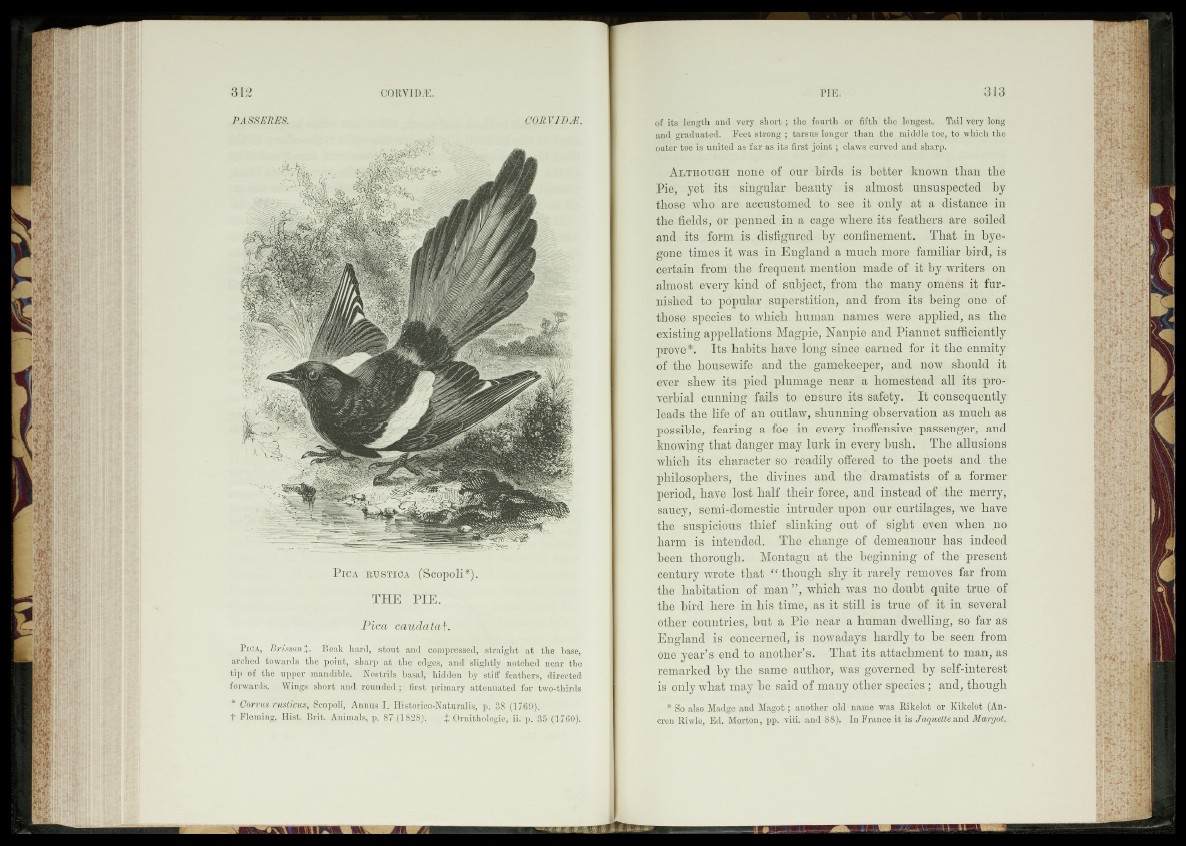
312 CORVIDS.
P ica r u s t ic a (Scopoli*).
THE PIE.
Pica caudata\.
Pica, BrissonX• Bèak hard, stout and compressed, straight at the base,
arched towards the point, sharp at the edges, and slightly notched near the
tip of the upper mandible. Nostrils basal, hidden by stiff feathers, directed
forwards. Wings short and rounded; first primary attenuated for two-thirds
* Corvus rusticus, Scopoli, Annus I. Historico-Naturalis, p. 38 (1769).
t Fleming, Hist. Brit. Animals, p. 87 (1828). i Ornithologie, ii. p. 35 (1760).
PIE. 313
of its length and very short; the fourth or fifth the longest. Tail very long
and graduated. Feet strong ; tarsus longer than the middle toe, to which the
outer toe is united as far as its first jo in t; claws curved and sharp.
A l t h o u g h none of our birds is better known than the
Pie, yet its singular beauty is almost unsuspected by
those who are accustomed to see it only at a distance in
the fields, or penned in a cage where its feathers are soiled
and its form is disfigured by confinement. That in bye-
gone times it was in England a much more familiar bird, is
certain from the frequent mention made of it by writers on
almost every kind of subject, from the many omens it furnished
to popular superstition, and from its being one of
those species to which human names were applied, as the
existing appellations Magpie, Nanpie and Piannet sufficiently
prove*. Its habits have long since earned for it the enmity
of the housewife and the gamekeeper, and now should it
ever shew its pied plumage near a homestead all its proverbial
cunning fails to ensure its safety. It consequently
leads the life of an outlaw, shunning observation as much as
possible, fearing a foe in every inoffensive passenger, and
knowing that danger may lurk in every bush. The allusions
which its character so readily offered to the poets and the
philosophers, the divines and the dramatists of a former
period, have lost half their force, and instead of the merry,
saucy, semi-domestic intruder upon our curtilages, we have
the suspicious thief slinking out of sight even when no
harm is intended. The change of demeanour has indeed
been thorough. Montagu at the beginning of the present
century wrote that “ though shy it rarely removes far from
the habitation of man ”, which was no doubt quite true of
the bird here in his time, as it still is true of it in several
other countries, but a Pie near a human dwelling, so far as
England is concerned, is nowadays hardly to be seen from
one year’s end to another’s. That its attachment to man, as
remarked by the same author, was governed by self-interest
is only what may be said of many other species ; and, though
* So also Madge and Magot; another old name was Rikelot or Kikelot (An-
cren Riwle, Ed. Morton, pp. viii. and 88). In France it is Jaquelte and Margot.